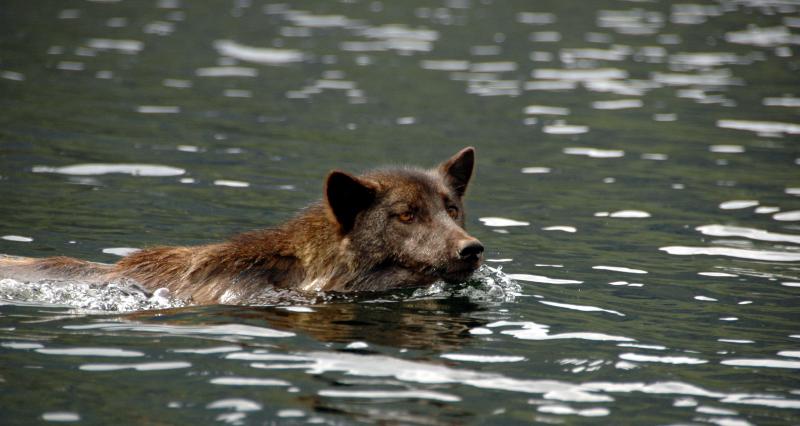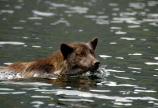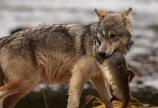Coastal wolves disagree on diet, splitting the species

The waggish joke that wolves are “Canada’s newest marine mammal” is a lot closer to truth than jest—an insight suggested by Indigenous knowledge and confirmed in a study co-authored by Dr. Chris Darimont, of UVic’s geography department.
The study, published this month in the scientific journal BMC Ecology, provides genetic evidence that BC’s mainland wolves and coastal wolves appear to be genetically distinct. And news media around the world are paying attention: in addition to Canadian coverage in The Globe and Mail, National Post and CTV, the story has also been broadcast—with video of wolves fishing for salmon—on BBC News in the UK.
The study of five wolf pack groups on the central BC coast near Bella Bella confirms what Chester Starr, an elder from the Heiltsuk First Nation, and his people have always known. In fact, Starr’s insight provided motivation for the study.
It was likely the profoundly different ecological environments that created the genetic separation, explains Darimont, Hakai-Raincoast professor at UVic and a scientist at the Raincoast Conservation Foundation.
Coastal islands offer wolves more marine-based foods, such as salmon and marine mammals—preferences that are passed on from generation to generation. Over time, coastal wolves bred more frequently with one another and less frequently with their deer-loving relatives on the mainland.
“The fact that this is not supposed to happen over such a short distance is what makes this special,” says Darimont. “We'd absolutely expect wolves from Alberta and Alaska to differ, but we would not expect this genetic gradient within an area that is only 2,000 square kilometres.”
The scientists analyzed DNA samples from more than 1,000 wolf scats collected in the field. The results confirmed anecdotal evidence of divergent hunting practices and diets for different wolf packs. The study found up to 85 per cent of the diet of island wolves come from the marine sources, whereas wolf populations with terrestrial diets seldom ate even 30 per cent seafood.
The discovery reminds us that although Indigenous and scientific approaches constitute different paths to knowledge, they’re rooted in the same reality and provide complementary information, adds Darimont. “Earlier in my career, I had assumed that ecological knowledge could only come from science. I was wrong, and it’s exciting to learn from this and similar experiences.”
—
BBC news coverage: http://www.bbc.co.uk/nature/27763772
CBC news coverage: http://www.cbc.ca/news/technology/wolves-on-b-c-s-islands-mainland-genetically-different-1.2669964
Globe and Mail: http://www.theglobeandmail.com/news/british-columbia/bcs-island-wolves-prefer-their-mellow-habitat/article19087340/
Published study: http://www.biomedcentral.com/1472-6785/14/11


